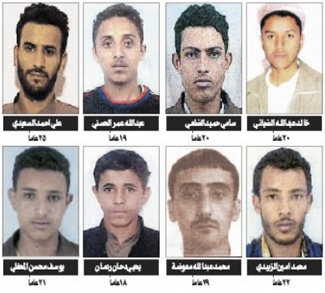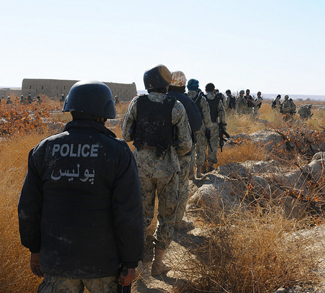FORECAST
Al Qaeda in the Arabian Peninsula’s entrenchment in Yemen, now firmly in the global spotlight, will be exceedingly difficult to reverse.
The situation unfolding in Yemen is one that has become painfully common for policymakers in Washington: a state teetering on the brink of collapse serving as sanctuary and breeding ground for Islamic extremism. In Yemen’s case as in others, soft state institutions have not only enabled the internal growth of extremism, but also frustrated foreign assistance by depriving the international community of an effective partner to work with.
It is unclear where Al Qaeda in the Arabian Peninsula fits into the Yemeni political landscape. It is extremely unlikely that they have found allies in the Shiite Houthi rebels in the north. Likewise, the separatist movement in the south will be hesitant to discredit their legitimate political demands by aligning with an international terrorist group.
Yet, even without overt allies, Al Qaeda in the Arabian Peninsula has managed to integrate itself into Yemeni tribal structures. This is a development that doesn’t bode well for a quick or decisive victory against Islamic extremism in Yemen.
Al Qaeda’s accord with Yemeni tribesman is crucially important given the tactics that America is likely to employ now that there is pressure on the Obama administration to ‘do something’ about Al Qaeda in the Arabian Peninsula. President Obama will fall back on a ramped up campaign of targeted drone and air strikes within Yemen, a strategy that could have disastrous consequences given the Yemeni’s state’s present weakness.
American drone strikes will give credence to Al Qaeda’s message while placing the Yemeni government on the wrong side of public support. Most of Yemen’s problems are rooted in politics and economics: widespread poverty, corruption, declining oil revenues, and a water shortage, to name a few. A perceived government complicity in civilian deaths at the hands of American drone strikes will hollow out an already shaky support base and drive Yemenis into the arms of Al Qaeda.
Perhaps this is why a December 17th airstrike on an Al Qaeda camp at Abyan was publically attributed to the Yemeni Air Force, albeit with hardware, intelligence, and other support from the Americans. The airstrike killed anywhere from two to thirty Al Qaeda militants, however it also killed scores of women and children due to the training camp’s proximity to village homes. Just days after the strike, Al Qaeda was back in Abyan, pressing for a gathering of thousands of tribesmen to stand with them against outside aggressors.
Over the next few months, the Obama administration will intensify drone strikes and throw money at the Yemeni government in the hope that some of it will evade individual pockets and be used in counterterrorism efforts. Al Qaeda in the Arabian Peninsula will continue to integrate itself into Yemeni tribal structures, thus relying on local knowledge and goodwill to shield them. This is a similar dynamic to the safe haven enjoyed by Taliban fighters along the Afghanistan-Pakistan border and within the tribal areas of Pakistan.
Al Qaeda in the Arabian Peninsula also has ideological allies across the Gulf of Aden in Somalia. Last week, a senior Al Shabaab official announced that the group would send fighters into Yemen. While a flood of Al Shabaab militants into Yemen shouldn’t be expected, as they are currently engaged in their own fight, their entering the fray would amount to yet another pressure being brought to bear on an already-fragile Yemeni state.
SUMMARY OF EVENTS: January 4th – January 11th, 2010
NORTH AMERICA
United States
U.S. President Barack Obama said on Wednesday “a mix of human and systematic failures” was to blame for the failed Christmas Day bombing of the U.S.-bound plane with some 300 passengers.
A federal judge dismissed all charges Thursday against five Blackwater Worldwide security guards accused of killing unarmed Iraqi civilians in a crowded Baghdad intersection in 2007.
The National Security Agency four months ago intercepted conversations among leaders of Al Qaeda in Yemen discussing a plot to use a Nigerian man for a coming terrorist attack, but American spy agencies later failed to combine the intercepts with other information that might have disrupted last week’s attempted airline bombing.
EASTERN EUROPE
Russia
Moscow has no knowledge of an alleged uranium deal between Iran and Kazakhstan but will look into the allegations, a Foreign Ministry spokesman said Thursday.
Russian Prime Minister Vladimir Putin said Tuesday U.S. plans for a missile defense system were the main obstacle to reaching a new deal on reducing Cold War arsenals of nuclear weapons.
Ukraine
Ukraine’s dispute with Russia on oil transit fees will not affect supplies to Eastern Europe, national oil and gas company Naftogaz said on Monday.
Ukraine denied on Friday allegations that a cargo plane loaded with illegal weaponry from North Korea was charted by a Ukrainian company.
MIDDLE EAST
Iran
Iranian opposition leader Mirhossein Mousavi said on Friday he was ready to die for his reformist campaign after a disputed election in June, defying hardline calls for his execution.
Iran has denied a Western media report of a secret $450-million deal to procure purified uranium ore from Kazakhstan.
Leaders of the Iranian opposition Mir Hossein Mousavi and Mehdi Karoubi have fled Tehran to a northern Iranian province, state news agency IRNA said Wednesday.
A representative of Iran’s Supreme Leader Ayatollah Ali Khamenei said on Tuesday opposition leaders were “enemies of God” who should be executed under the country’s sharia law.
Iraq
The Iraqi government will push to appeal a US court ruling dismissing charges of murder against five security guards of the private Blackwater firm, an official has told Al Jazeera.
Israel
Israeli aircraft attacked at least four targets in the Hamas-run Gaza Strip early Saturday, wounding two people in an apparent retaliation for a rocket strike on Israel, officials said.
Yemen
Houthi fighters in northern Yemen say they have seized control of a Saudi military post along the border between the two countries where Saudi and Yemeni forces are waging a campaign to uproot them.
Yemen’s Shi’ite rebels said on Thursday they were ready for talks to end fighting with neighboring Saudi Arabia, and issued a taped message from their leader to disprove reports he had been killed.
Yemeni security forces clashed with al Qaeda fighters in western Hudaydah province on Wednesday, wounding several, a Yemeni official said.
The U.S. and Yemen are now looking at fresh targets in Yemen for a potential retaliation strike, two senior U.S. officials told CNN Tuesday, in the aftermath of the botched Christmas Day attack on an airliner that al Qaeda in Yemen claims it organized.
The US has opened a covert front against ‘al-Qaeda’ in Yemen by offering support to the country’s military operations, a US intelligence sources says.
SOUTH ASIA
Pakistan
A suicide car bomber has attacked a site where a volleyball game was being played in northwest Pakistan, killing at least 88 people and wounding scores more, sources say.
Afghanistan
The CIA vowed on Thursday to avenge the deaths of seven officers in a suicide bombing in Afghanistan and to investigate security breaches that allowed the second deadliest attack in agency history.
Eight Americans reportedly working for the CIA have died in a bomb attack in Afghanistan, the worst against US intelligence officials since 2001.
India
New Delhi is backing away from embracing the IPI pipeline because of differences with Pakistan, sources said.



